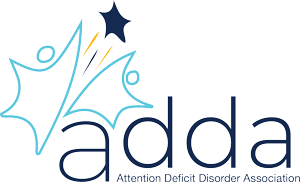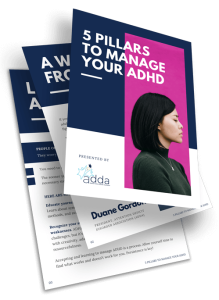
10 Signs and Symptoms of ADHD in Adults (And When to Get Help)
Signs of ADHD aren’t as easy to spot in adults as in children. Adult ADHD can be more subtle and misinterpreted as another mental health condition, complicating its diagnosis. Plus, many people with ADHD mask their symptoms to cope and fit in.
Whether or not ADHD was diagnosed during childhood, it can pose different challenges during adulthood. Symptoms can affect more aspects of your life, such as personal relationships, work, and emotions.
Without treatment and support, ADHD can cause people to struggle with career goals, memory loss, and daily tasks at work and home.
Recognizing signs of ADHD is the first step toward real change. Knowing the facts empowers you to seek the professional help you may need to overcome challenges and thrive.
Read on to discover some of the main signs and symptoms of ADHD in adults.
While many people will experience these issues at some point, ADHD means a persistent pattern (at least six months) of behavior that interferes with your ability to function.
Originally published on October 11th, 2022, this article was updated and republished on June 16, 2025.
What Is ADHD?
ADHD, or attention-deficit/hyperactivity disorder, is a form of neurodivergence that affects how the brain works. In adults, it typically involves a persistent pattern of inattention and/or hyperactive and impulsive behaviors.[1]
About 5% of adults are estimated to have ADHD.[2] While the symptoms may appear differently in adults, the impact on daily life is just as real. Adults with ADHD often struggle in various areas, including focus, memory, time management, and organization.
If you experience these challenges, it doesn’t mean you’re lazy, irresponsible, or unmotivated. It simply shows that your brain is wired differently.
Understanding your symptoms and how your brain works is the first step toward finding the right strategies and support. With this, you can learn to harness your strengths and work with your ADHD, not against it.
Types of ADHD
The symptoms of ADHD can look different from person to person, depending on the type of ADHD they have or their subtype.
In general, there are three main subtypes of ADHD:
- Predominantly inattentive ADHD
- Predominantly hyperactive or impulsive ADHD
- Combined type ADHD
Let’s explore each subtype in more detail.

Inattentive Type ADHD
Adults with inattentive type ADHD have more difficulty with their focus, attention, and memory.
This is the most common subtype in adults.[2]
These individuals are more likely to notice the following:[3]
- Having trouble organizing their documents or belongings
- Losing focus quickly when working on boring tasks
- Having many distracting and unrelated thoughts
- Avoiding tasks that require them to stay focused
- Getting distracted in conversations
- Struggling with time management
- Forgetting to do an errand or task
- Overlooking important details
- Making careless mistakes
- Misplacing important items
You may be diagnosed with inattentive type ADHD if you experience six or more of the above symptoms for six months or longer.[3]
Hyperactive/Impulsive Type ADHD
Someone with hyperactive or impulsive type ADHD is more likely to struggle with symptoms linked to restlessness and poorer impulse control.
This is the second most common type of ADHD in adults.[2]
It comes in second after inattentive ADHD because symptoms of inattention are more likely to persist into adulthood compared to symptoms of hyperactivity or impulsivity.[1]
Individuals with this form of ADHD may notice the following:[3]
- Constantly leaving their seat when expected to stay seated
- Blurting out answers before the question is completed
- Fidgeting and moving about when seated
- Cutting into other people’s conversations
- Having trouble waiting their turn in line
- Taking over other people’s activities
- Often feeling restless
- Interrupting others
- Talking excessively
- Always on the go
A diagnosis for this type of ADHD may be made if you have six or more of the above symptoms for at least six months.[3]
Combined Type ADHD
A person who persistently struggles with both symptoms of inattention and symptoms of hyperactivity or impulsivity has combined type ADHD.
This is the least common kind of ADHD in adults.[2]
You may be diagnosed with combined type ADHD if you have six or more symptoms of inattentive ADHD and six or more symptoms of hyperactive-impulsive type ADHD.[3]
ADHD can look very different from one person to another, even if they have the same subtype of ADHD.
This is why it’s important to personalize your treatment, therapy, and coping strategies based on your symptoms.
10 Signs of Adult ADHD
Individuals with inattentive ADHD are more likely to experience the following symptoms:
1. Trouble Focusing or Paying Attention
People with ADHD may lack control over what they focus on and have difficulty concentrating.
You may notice the following:[3]
- Easily distracted
- Daydreaming
- Zoning out during conversations
- Overlooking instructions and details
- Unable to finish projects or tasks on time
Another symptom of ADHD is a tendency to hyperfocus on projects you find exciting and interesting. In this state, you may be unable to turn your attention toward other important tasks or people in your life.[4]
2. Losing Things Frequently
Storing, organizing, or keeping track of belongings can be troublesome for those with ADHD.
This can involve:
- Misplacing everyday items (i.e., car keys or wallet) while the brain is on autopilot
- Losing track of where an item is placed after a moment of inattention
- Constantly retracing steps to find lost items
- Storing things in the wrong places (i.e., work papers in your car, dirty dishes in the bedroom).
3. Chronic Lateness and Poor Time Management
Due to poor time management, adults with ADHD often run late for meetings, appointments, or social plans.
Reasons include:
- Unable to find required items (car keys, wallet, meeting notes, etc.)
- Forgetting dates and times
- Underestimating the time needed to complete tasks, also known as ADHD time blindness
- Getting distracted while preparing for an appointment or event
4. Impulsivity and Risk-Taking
Research shows that adults with ADHD are more likely to engage in risk-taking behavior (RTB).[5] These behaviors may involve the following:
- Starting arguments or fights
- Overspending
- Reckless driving
- Substance use (alcohol or drugs)
- Risky sex-related decisions (i.e., unprotected sex)
- Gambling
- Impulsive eating
By seeking help and support, you can proactively reduce your chances of involvement in these activities.
5. Difficulty Listening and Following Instructions
Social interactions may feel like a challenge if you have ADHD. You may struggle with: [3]
- Waiting for your turn to speak
- Staying on topic
- Keeping track of the conversation
- Using non-verbal cues to show active listening
- Talking too fast
- Speaking too much
- Blurting out words that make others uncomfortable
- Unable to read other people’s body language

6. Struggles with Prioritizing Tasks
Adults with ADHD are almost always occupied. However, deciding which task to prioritize can be a challenge.
You may struggle with prioritization for any of the following reasons:
- Feeling like you have too much to do (which can overwhelm you, even get you into a state of ADHD paralysis)
- All tasks feel equally important
- Difficulty thinking ahead – you underestimate deadlines
- Seeking novelty over familiar tasks that may be more significant and relevant
Adults with ADHD also tend to procrastinate on tasks that require more focus and attention, leading to missed deadlines and workplace issues.
7. Relationship Struggles and Communication Issues
Problems in relationships with friends, colleagues, family, or partners are another common issue for adults with ADHD.
There are several reasons why symptoms of ADHD can cause tension, anger, and frustration.
Some ADHD traits that may lead to relationship strains include:
- Speaking over the other person
- Not actively listening to the other person
- Forgetting important events and dates (like birthdays)
- Blurting out hurtful statements
- Failing to fulfill responsibilities, commitments, or promises
- Trouble regulating emotions
Despite these challenges, adults with ADHD can have happy relationships and fulfilling marriages. Seeking professional counseling and support is one of the best ways to work toward this.
8. Hyperactivity or Restlessness
Another sign of ADHD in adults is restlessness. This may present in a variety of ways:
- Flight of thoughts
- Constant fidgeting
- Tics and impulsive behaviors
- Overthinking and catastrophizing
- Trouble sitting still
Fidgeting is often misinterpreted as inattention in adults with ADHD. However, fidgeting and stimming can signify attempts to stay focused when a task doesn’t provide enough stimulation for the brain.
Interestingly, fidgeting may help increase the ability to focus and concentrate in adults with ADHD.[6]
9. Forgetfulness and Working Memory Issues
ADHD may impact two different kinds of memory.
Working memory is your brain’s short-term storage space, and it’s where adults with ADHD are more likely to experience problems.[7]
Here are some examples of how ADHD can impact working memory:
- Forgetting things on grocery lists
- Leaving essential items at home
- Losing track of belongings
- Difficulty following instructions to complete tasks
- Re-reading sections of text due to not retaining information
ADHD’s impact on long-term memory isn’t well understood. Some research shows that adults with ADHD may experience problems with long-term memory.
That’s because the ADHD brain may encode information in a disorganized way, interfering with the storage of new information.[8]
10. Emotional Outbursts and Irritability
Around 30-70% of adults with ADHD experience mood swings (emotional dysregulation).[9]
Adults with ADHD may notice the following signs of emotional turbulence:
- Impatience when under stress
- Explosive outbursts of anger
- Persistent irritability
- Surges of anger when met with everyday obstacles
- Frequent and reactive mood changes
- Unaware of the other party’s feelings
Professional therapy, medications, and self-care can play a vital role in managing ADHD-related anger.

Related Conditions and Challenges
In certain people, ADHD can be harder to spot and diagnose.
One possible reason is that ADHD often occurs alongside other conditions. These may include anxiety, depression, and substance misuse. About 80% of adults with ADHD report having at least one other mental health issue.[10]
When symptoms overlap, diagnosis and treatment can become more complicated.
Co-occurring conditions like anxiety or depression can often mask or mimic ADHD symptoms, making it harder to tell them apart. For example, trouble focusing might be caused by anxiety or depression as well. Without careful evaluation, this overlap can lead to misdiagnosis or delays in receiving proper treatment for either condition.
While co-occurring conditions may bring added challenges, they don’t define who you are or what you can accomplish. The key here is to seek professional help and treatment. An effective care plan will take all conditions into account, helping you manage your symptoms and function at your best.
Adult ADHD Symptoms: It’s Not Too Late to Get Them Diagnosed
Many adults live for years without realizing they have ADHD. Instead, they blame themselves, thinking their struggles are due to personality flaws, laziness, or bad habits.
That’s why getting a diagnosis can be life-changing. It brings clarity, eases the guilt, and opens the door to the right treatment, tools, and support. With this, many adults with ADHD go on to lead more confident and empowered lives.
This is why it may be worth evaluating your symptoms if you’ve struggled with focus, memory, or restlessness but never understood why. The process usually involves talking to a healthcare provider about your experiences and how your symptoms affect different parts of your life.
Remember that it’s never too late to seek help, even as an adult. This step often marks the beginning of a new chapter where you can finally get the support and resources you need to thrive and achieve your goals.
How to Know if You Have Adult ADHD
If you’re experiencing symptoms like lack of focus, restlessness, or poor memory, you may be concerned that you have ADHD.
You can take an adult ADHD screening test, which can give you a better idea of what your symptoms indicate.
Of course, the best way to determine whether you have the condition is by getting assessed by a healthcare professional.
ADHD can look quite different in adults compared to children. So, try to pick a doctor or specialist who has experience diagnosing and supporting adults with ADHD.
To get a diagnosis, you need to have a few symptoms of the condition, not just one. Your doctor will also ask how these symptoms have affected your daily activities and how long you’ve been experiencing them.[3]
Additionally, they may ask to talk to someone who knew you well as a child, like your parent or guardian, to find out if you showed signs of ADHD in your childhood.
While it might feel daunting to seek help, it’s more than worth it. Many adults who receive treatment for their symptoms see improvements in many areas of their lives.

Adult ADHD Symptoms: It’s Not Too Late to Get Them Diagnosed
ADHD can be hard to spot in adults. But the more you learn about its signs and symptoms, the more likely you are to recognize them early on.
Ultimately, it’s best to take your concerns to a trusted healthcare provider who can address them effectively.
The ADDA adult ADHD test is a great starting point to screen yourself for signs of ADHD.
Check out ADDA’s online resource hub if you’d like to learn more about adult ADHD. Here, you’ll gain access to support groups, communities, and tips on how to live and thrive with ADHD. Join ADDA+ to unlock everything we have to offer.
References
[1] Prakash, J., Chatterjee, K., Guha, S., Srivastava, K., & Chauhan, V. S. (2021). Adult attention-deficit Hyperactivity disorder: From clinical reality toward conceptual clarity. Industrial Psychiatry Journal, 30(1), 23–28. https://doi.org/10.4103/ipj.ipj_7_21
[2] Ayano, G., Tsegay, L., Gizachew, Y., Necho, M., Yohannes, K., Abraha, M., Demelash, S., Anbesaw, T., & Alati, R. (2023). Prevalence of attention deficit hyperactivity disorder in adults: Umbrella review of evidence generated across the globe. Psychiatry Research, 328, 115449. https://doi.org/10.1016/j.psychres.2023.115449
[3] de la Peña, I. C., Pan, M. C., Thai, C. G., & Alisso, T. (2020). Attention-Deficit/Hyperactivity Disorder Predominantly Inattentive Subtype/Presentation: Research Progress and Translational Studies. Brain sciences, 10(5), 292. https://doi.org/10.3390/brainsci10050292
[4] Ashinoff, B. K., & Abu-Akel, A. (2021). Hyperfocus: the forgotten frontier of attention. Psychological research, 85(1), 1–19. https://doi.org/10.1007/s00426-019-01245-8
[5] Pollak, Y., Shoham, R., Anouk Scheres, & Dekkers, T. J. (2023). ADHD and Risk-Taking Behavior: Associations, Mechanisms, and Interventions. Autism and Child Psychopathology Series, 295–332. https://doi.org/10.1007/978-3-031-41709-2_12
[6] Son, H. M., Calub, C. A., Fan, B., Dixon, J. F., Rezaei, S., Borden, J., Schweitzer, J. B., & Liu, X. (2024). A quantitative analysis of fidgeting in ADHD and its relation to performance and sustained attention on a cognitive task. Frontiers in Psychiatry, 15, 1394096. https://doi.org/10.3389/fpsyt.2024.1394096
[7] Tolonen, T., Leppämäki, S., Roine, T., Alho, K., Tani, P., Koski, A., Laine, M., & Salmi, J. (2024). Working memory related functional connectivity in adult ADHD and its amenability to training: A randomized controlled trial. NeuroImage: Clinical, 103696. https://doi.org/10.1016/j.nicl.2024.103696
[8] Minear, M., Coane, J. H., Cooney, L. H., Boland, S. C., & Serrano, J. W. (2023). Is practice good enough? Retrieval benefits students with ADHD but does not compensate for poor encoding in unmedicated students. Frontiers in Psychology, 14. https://doi.org/10.3389/fpsyg.2023.1186566
[9] Astenvald, R., Frick, M. A., Neufeld, J., Bölte, S., & Isaksson, J. (2022). Emotion dysregulation in ADHD and other neurodevelopmental conditions: a co-twin control study. Child and Adolescent Psychiatry and Mental Health, 16(1). https://doi.org/10.1186/s13034-022-00528-0
[10] Choi, W.-S., Woo, Y. S., Wang, S.-M., Lim, H. K., & Bahk, W.-M. (2022). The prevalence of psychiatric comorbidities in adult ADHD compared with non-ADHD populations: A systematic literature review. PLOS ONE, 17(11), e0277175. https://doi.org/10.1371/journal.pone.0277175






16 Comments
i am struggling with all those symptoms i could not believe when i read this article , it felt like they talking about me. I am currently awaiting for my assessment next week and hoping that i can get some help. i have explained my symptoms to my GP and they put it down to my anxiety and depression. been 15 years taking medication for anxiety and depression but nothing has changed. I referred myself to adhd assessment and I am sure of the result already. i hope you people got some sort of help after your diagnosis. I am fed up with talking therapy, psychologist and all sort of mental health treatment but nothing is working so far. i am so frustrated at my GP whom rather dismiss your symptoms to avoid doing more work. good luck for everyone.
I actually cried when I saw this article. I felt so misunderstood all my life, had no answer for I know I need to apply for jobs but I can’t do it.
Need to get evaluated and then screening test of ADD gave me 1930 and ASRS gave 99.5 percentile. I had so many constant injuries as a child even as an adult.
What a thorough write-up – thank you! It was extremely helpful and I don’t feel so alone with a spouse with this condition. While my husband and I are from two different cultures and speak 3 different languages at home – I undersatnd that adds to the challenges, however..Do you have suggestions on how to navigate life with a spouse (husband) that denies he has any form of ADHD all together? He insists these signs and symptoms he presents are attributed to simply my disrespect and poor communication. I am so drained. He is tempermental and impatient, having high expectation of me to enable him to do things I think he has the capacity of doing. I handle our banking and all admin for obvious reasons. He calls it “my strength” and not his, so I should do it (I dont think it’s my strength but rather a necessity for adulting and I simply organize myself and do the things I need to do).He has been clear he is not interested in an audio book, app or counseling for BOTH of us to navigate our challenges. I’m out of prayers, friends think he’s intense and it’s very isolating. Anyone have insight or thoughts?
Thank you for sharing Barbara. I’m a 59 yo female who was diagnosed yesterday. I completely relate to what you’re saying. Through lengthy discussion with my primary care physician, we’ve discovered/decided that this has been an issue my entire life. I always thought, this is just me, I can’t sit still, I’m rarely on-time, lose everything and was raised in a loud, talk over everyone ‘Old World’ Italian family. I was never able to keep track of things, so I developed coping skills. Things like my car key on a lanyard that stays around my neck if I leave the house and when I walk into the house, the key has an immediate ‘home’ in the entryway. If I deviate from this all bets are off on when/where the key will turn up again. The list of symptoms and coping mechanisms goes on and on…
I’m writing more for my contrast. It’s weird, I was most comfortable and happy during the early stages of COVID. Life became easier, I didn’t have to interact with many people, my anxiety diminished and I was much more relaxed. All ‘social’ activities became bike rides or other athletic activities where I didn’t need to have conversations that I would later overanalyze as to why I was such an idiot for what I said and for my constant interjections. My life overall improved those 1st 18 months or so.
Then the ball dropped. Life for everyone else got back to normal. I haven’t been able to go back to the pre-COVID me who was able to fully function and thrive. I’ve destroyed most relationships I had before, my anxiety is through the roof, I’m no longer able to function in social situations. On the positive side, I’ve met a wonderful man in the past year. He’s been a big help, we’ll see where that goes. He keeps telling me he thinks all my idiosyncrasies are great and that they allow me to accomplish so much and tries to keep me positive even when I start to fall apart. No, he’s not perfect, but he really helps.
With a diagnosis, I feel empowered. I’m going to try to find meds that will work/help. I can’t go on the way I’ve been for the past 3+ years. I’m hopeful things can and will change for the better for the 1st time in quite a while. Reading others take on things and what they’re going through is also helpful. Thanks to all of you for sharing.
I’m 76 and undiagnosed ADHD and OCD. Or self-diagnosed, rather. I checked off so many of those symptoms that I’m fairly sure my self-diagnosis is correct. However, I’ve lived with this condition so long that it would be more traumatic to try and change me. I’m ok, reasonably happy and accepting of the way I am. I get more accomplished than many people I know. I’m trying to be more patient but I have little patience. Even though I’m different, a bit odd, some may say a lot odd, I’ve always made and maintained close friendships so realizing there is a name for my differences compared to others is enough for me.
I am 66 tears old and my husband is convinced that I have ADHD. Ptocrastination, impulsiveness, and focusing on tasks are just a few of the symptoms that is causing me problems. As a child my mother would tell others that I was hyperactive and would laugh and keave it at that. As I aged, my symptoms became more prevalent. I make a list of tasks to complete, but don’t refer to the list as I am completing these tasks. I will start another list and include 10 other tasks that I noticed needed to be done. I’ll begin a task but then get easily distracted and before I know it, I have 6 tasks that I’m working on but none of them have been completed. I am compulsive as well which doesn’t help the cause. Thrrr are things that I really like such as a certain nail polish or a certain type of capris. I absolutely have to have every color of that nail polish and every color available in the capris. I also recently began using crystals and you can only imagine how many of those I have. I am big on organizing my things but lose interest after starting the organization process. So thank you for your comments on this “illness” and I will be talking to my physician about getting some help.
I am beginning to wonder, I looked at the symptoms and realised some of them is me to a T, I just put them down to dyslexia and that my brain is overactive and I have never learnt to switch it off.
I forever losing things or leaving things behind forgetting where I put them (even if it was just a few minutes ago), I am always underestimating how long it takes me to do something, I am only organised if it doesn’t matter, I find it almost impossible to keep my room tidy, I can’t concentrate on boring brain numbing tasks (they take me forever to do because I end up daydreaming, but found listening to music or a audio book helps), I good at making silly little mistakes for no reason (one just cost me my job), I find it hard to me serious, sad when I am feeling happy plus vise-versa and I can get very emotional (I have to wear my emotions on my sleeve).
but I am not hyper active (never have been) perfectly capable of sitting for hours with puzzle books or games or computer games. I can in fact be very lazy.
This is me in a nutshell!!!!
Hello all! I have tried to convince people that my struggle is real but because I am successful they think I am making this up. Ever since the 80’s I feel like this is a secret and no one believes me. I hit so many box 85% and everything make so much sense. I even tested on psychology today 3 time and they said I am in the top 33% testing as having it. It’s even tough for me to type this because it requires that I focus. My sentences are getting less complete as I get older but I used to have to put 4 things on a piece of paper when lunch time came because I could never remember what I was supposed to do. I had to write in a circle because I am the one that overlaps and zig zags my travel when if I could slow down and focus and put in order I would save time and money but I feel like a lot of the things I read are like putting me in a straight jacket. I have wanted to be assessed but maybe I look in the wrong places. I will be reading all of your comments tonight to see if someone has a roadmap. I read enough to be grateful to Barbara Johmsons comments to see if I am on to something. I wiggle my leg, been late for 40 years and it’s my unfortunate trademark. I am worried at 61 soon this will be blurred with dementia or Alzheimers so time is of the essence to get a handle on this. Thank you so much for the information. I want to know how to settle these racing and exhausting behaviors. I am a successful business woman and like they said were use our other strengths but would be nice to calm this restless see just once and know what to do to improve my focus etc.
This list of symptoms and traits is like many other ADHD traits lists I’ve found online. Generally I find they are true and correct based on my experience as someone with suspected ADHD (undiagnosed). However, such lists suggests there are no positives at all, positives such as high intelligence and an insatiable desire to help others as part of the pursuit of dopamine. Personally, I’m currently on one of many courses and programs I’ve purchased or registered for. I think it’s ADHD that has made me develop big improvements to that being taught in order to better understand what I’m learning. I think it’s also ADHD that has led to my suggestions for improvements to be ignored and generally to also be invalidated, perhaps because I’m giving them too much feedback in a short time, or perhaps because they only consider the needs of neurotypical people. I am expecting to quit paying for the extra study community since I often don’t feel supported. Oh and why is a website address required to comment here, but not an email address?!
It really helped when you elaborated on ADHD’s types and symptoms commonly found in adults. The past months have been hard because my wife’s experiencing burnout symptoms, and after reading your post, she might have ADHD signs too. I’ll talk to her about getting an appointment with a healthcare provider to evaluate her mental health.
I so relate to you ladies. I just turned 54 and only recently realised I have ADHD. I think its a pretty extreme form. Im yet to be diagnosed.
I am also a high achiever. registered nurse, raised 3 amazing kids and have done multiple businesses over the years.
My latest one . Wearable lights for Healthcare workers. nursechill.com
My point is that I am classic at taking on too much. being very scattered. Severely hyperfocused but not focusing on other important things in my life. Such as paying bills and taxes. (its boring)
Ive noticed a severe increase in my symptoms this past year.
Im not sure if its menopause or the fact that my coping mechanisms over the decades are no longer working. Either way its been tough.
I’ve been feeling a little like Rosie I’m afraid.
I think I’m just exhausted from 54 years of managing this when I didn’t even know I had it.
I’m so tired.
I have tried on two occasions to get a diagnosis from my gp but the forms I filled in, one was for childhood and the same questions for now as an adult. Adhd was never heard of in the 60’s and 70’s and we were under fear of severe punishment if we got up and walked out at school. I have muddled through, some how, to now my 60th year but I fear its coming in too much now. I need direction, instructions and motivation . Feel like I may as well not be here
Hello Rosie, I’m so sorry you’re struggling with this, I can totally relate! I’ll be 55 in April and just learning about all the symptoms ~my life makes a little more sense, kinda😐 I’ve recently stopped drinking alcohol after an extender time of trauma/self medicating & the symptoms (ADHD) have seemed to have taken over or I should say I’m extremely more aware of them! Brought me back to my childhood/early adulthood Feeling anxious and lost! I’m still waiting to see my GP (in office once a week) but I do find that this meditation page helps!! https://www.theepicself.com/meditations/focus/
P.S We need you here & you are loved!! Wishing you an abundance of love & all that you need!! Stay strong!
Big {{HUG}}✌️❤️
Kat
Hi Rosie,
I really understand how you’re feeling! I’m also a child of the 60s and I had no idea I had ADHD until the pandemic hit and I was totally isolated with just my three cats, God bless them! I live alone so no partner to help deal with it all. The result was severe depression, anxiety, panic attacks, and a total collapse of my former brain functioning capabilities. Typically, I was never diagnosed as a child and was a good student, although always late with things, a procrastinator, and a bit of a day dreamer. Women and girls, especially, learn how to develop coping techniques so that we can make our way through the world without too much trouble. In fact, I’m a university professor, but it was hard to get here, that’s for sure. Still, I did it and was managing to do a good job at everything–until the pandemic caused my brain to implode and nothing worked right any more. It was terrifying, confusing, and I was ashamed! I kept saying to myself, “Barbara!! Get it together, girl!” but the more it went on, the worse it got. Finally, a friend who had been recently diagnosed told me I had ADHD when I was describing what was going on with my brain. I did some research and, geez Louise, he was right! Of the list of 15 common symptoms, I clearly had 12! It was a terrifying realization, but after a few minutes, it became a relief to know that I wasn’t going crazy. I was already seeing a therapist for my depression and I asked her if there was anyone in her practice that dealt with ADHD, and thankfully, there was. It took a while to get in (about a month!) but after several interviews and tests, sure enough, I have a pretty severe case of Combined ADHD. My psychiatrist prescribed Adderal, which helped a bit, but the dosage was too low, so he upped it until we found a level that worked well. It’s amazing what being clear thinking can be like after so long in a daze–just miraculous!! I’m still working hard to find ways to deal with this because it hasn’t abated in this post-pandemic (hopefully) period, so I was excited to see this group and all the assistance it can provide.
The bottom line, Rosie, is that you need to keep looking until you find someone who can help you. If your GP isn’t helping, than move on to a psychological practice that offers ADHD testing and counseling. If you can’t get in right away, call another practice until you find one that can take you. You have to remember that this sudden awareness of psychological disorders like ours has exploded because of the pandemic, so you have to be patient, but it’s worth it–and keep coming here to find ways of coping now as you’re learning to deal with it. It’s not easy, but with a website like this, a community this this one, and a bit of patience and kindness to yourself, you’ll get it under control and keep it managed in such a way that you will do great! I hope this helps you and anyone else who’s just discovered that they are dealing with this condition. It’s hard to accept but we are very lucky that there is so much available to us now that wasn’t available even 10-15 years ago. Be patient with yourself, keep the faith, and remember to breathe. You’ve got this, even if it doesn’t feel like it at the moment. It will!
Take care and know that there are lots of people here who want to help. Bless you, Rosie! Keep your courage up and frustration level down, and you’ll be fine. Barbara
Rosie, how are you now? I just read your comments
today 9/24/25. I hope you are doing well. I’m praying for you.
Jackie